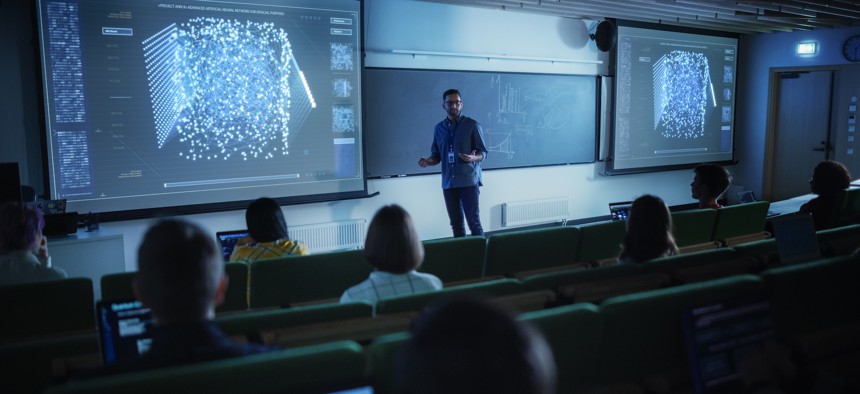Senate lawmakers look to set standards for educating America’s AI workforce

Gorodenkoff/Getty Images
New legislation would model emerging tech training on processes used to establish NIST’s National Initiative for Cybersecurity Education.
A new bill looks to strengthen and cultivate a workforce fluent in artificial intelligence, cybersecurity and other emerging and critical technology fields.
Introduced by Sen. Gary Peters, D-Mich., on Feb. 8, the AI and Critical Technology Workforce Framework Act would create a strategy focused on emerging technology, modeled after the National Initiative for Cybersecurity Education framework developed by the National Institute of Standards and Technology.
The proposed framework would help define industry terms in areas like AI and machine learning, and then compile a rubric for skills education and training. A key goal of the bill is to keep the U.S. job market globally competitive and tech-savvy as more countries vie for a competitive advantage in various emerging tech fields.
“As artificial intelligence continues to play a bigger role in our society, it’s critical [that] the future of this groundbreaking technology is formed in the United States,” said Peters in a press release. “The way to ensure that happens is by building a workforce engaged in these new technologies.”
The bill boasts bipartisan support, with Sen. Eric Schmitt, R-Mo., cosponsoring the legislation.
“This bill will ensure that America continues to have a strong and increasingly skilled workforce, will utilize AI to bolster American industry, and will incentivize companies to keep their jobs in the United States rather than outsourcing them overseas,” Schmitt said. “Additionally, this bill’s potential to benefit our defense capabilities is endless.”
Proposed frameworks for more emerging fields emphasize the need to integrate top individuals from nontraditional educational backgrounds to support broad technological fluency. In addition to a workforce framework for AI, other emerging industries — namely advanced biotechnology and quantum computing applications — are also eligible for similar guidance development.
As with NICE, the proposed frameworks would be helmed by NIST, and seek input from stakeholders within industry, academic, and government agencies.
The bill’s proposed framework would mean more work for NIST, an agency within the Department of Commerce that is seeing an increasing workload as both Congress and the Biden administration aim to bring regulation and growth to the U.S.’s AI sector.
Early this year, four senators requested an extra $10 million in operational funding to support NIST’s work in AI research. Peters’s team told Nextgov/FCW that he fully supports more federal funds allocated towards NIST.
“As a member of the Appropriations Committee, Senator Peters is pushing for robust funding for NIST, especially as it carries out any new functions related to AI,” a Peters aide said.
This article was updated February 14 with additional information.
NEXT STORY: Commerce advisory committee urges government to boost startup access to talent, funding



